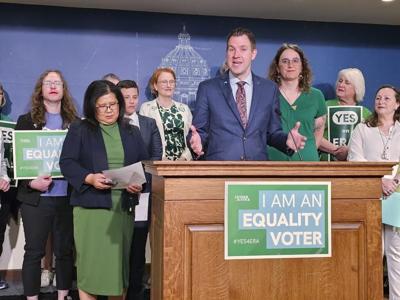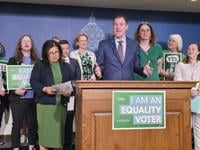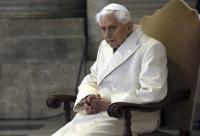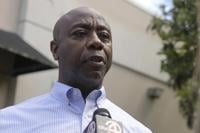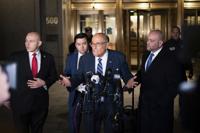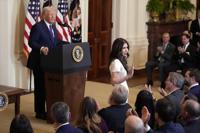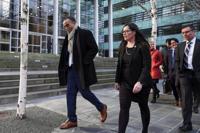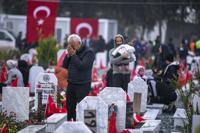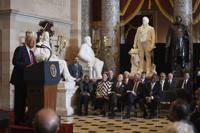ST. PAUL, Minn. (AP) — Impassioned supporters and opponents of a far-reaching Equal Rights Amendment to the Minnesota Constitution flocked to the State Capitol ahead of crucial votes aimed at putting it on the 2026 ballot.
However, the state House adjourned without voting on the bill late Monday after debate on unrelated bills ran out the clock. It wasn't immediately clear when the measure would be taken up on the floor.
The amendment would guarantee some of the nation's broadest protections of abortion and LGBTQ+ rights if it is approved by both chambers this session and then by voters in two years. Anti-abortion activists and conservative religious groups are campaigning to defeat it, but Democrats hold enough seats to pass what has been a top party priority.
Dozens of green-clad ERA supporters holding signs saying “I AM AN EQUALITY VOTER” and “You Belong Here” with a rainbow flag design sang in a chorus outside the House chamber ahead of a floor session that was expected to last into the night. ERA opponents gathered alongside them, wearing red shirts and holding red "STOP ERA” signs.
would prohibit the state from discriminating against anyone on the basis of race, color, national origin, ancestry, disability or sex — including gender identity, gender expression and sexual orientation. It does not include the word “abortion,” but that's meant to be protected by prohibiting the state from discriminating against a person “making and effectuating decisions about all matters relating to one’s own pregnancy or decision whether to become or remain pregnant.”
The Rev. Doug Donley, pastor of University Baptist Church in Minneapolis, showed up in rainbow colors, holding a pro-ERA sign. Transgender people “have always been part of the church. They’ve often had to hide the reality of who they are,” Donley said. “Church ought to be a place where people can be who they are fully.”
His sister, Trish Donley, a retired obstetrics nurse in St. Paul, said she knows what can happen if a timely abortion is denied to someone in a health crisis.
“People can bleed to death. People can have uterine ruptures, fallopian tube ruptures. It’s just not okay for someone else to decide that,” she said.
Putting up red signs around the rotunda, David Mennicke, a music professor in St. Paul, wore a red shirt saying “NO CONSTITUTIONAL AMENDMENT to kill unborn babies.”
“A child in the womb is a human being at an early stage of development,” Mennicke said. The ERA “would enshrine in the constitution that this child is not worthy of life and has no rights. I’m speaking out for the rights of those who have no voice.”
His wife, Katherine Mennicke, a retired special education teacher, said the kinds of children she worked with are often targeted for abortion. “I can’t support that — because I know them and love them. And they have wonderful things to contribute.”
Ahead of the debate, Republicans proposed 17 changes to the ERA to try to blunt its impact. But Democrats and Democratic Majority Leader Jamie Long, of Minneapolis, said they had the votes to hold them off and pass the proposal.
“Minnesotans believe in fairness. They believe in equality. They oppose discrimination,” Long told reporters. “These are all fundamental and core values that we hold dear. And today, we’re going to make sure that those are values that are not just protected by our law, but are protected by our Constitution.”
Democrats hold just a one-seat majority in the Senate, which passed an ERA proposal last year that did not include explicit protections for abortion rights. This time, the House author, Democratic Rep. Kaohly Her, of St. Paul, said supporters hope the Senate simply accepts the House language so that negotiations aren’t needed to resolve the differences.
ERA opponents have already launched a $1 million ad campaign, and staged a rally that drew hundreds of people to the Capitol last Wednesday. At news conferences last week, they said the amendment deceitfully glosses over how it would ensure that Minnesota has no restrictions on abortion.
They also said it would infringe on religious freedom by not including people of faith as a protected class. And they said it could force people to endorse practices that violate their deeply held beliefs.
“It advances moral progressivism, enabling the sexual revolution to bludgeon the religious beliefs of Minnesotans," the Rev. Steven Lee, a pastor at The North Church in Mounds View, told reporters.
Long and Her disputed this on Monday, saying that both the state and federal constitutions already protect religion.
___
Trisha Ahmed is a corps member for the Associated Press/Report for America Statehouse News Initiative. is a nonprofit national service program that places journalists in local newsrooms to report on under-covered issues. Follow her on X, formerly Twitter:

